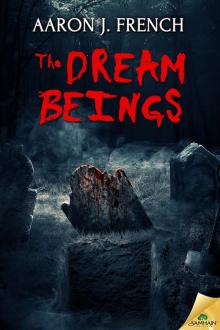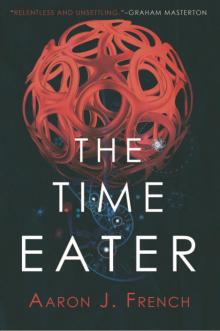- Home
- Aaron J. French
Songs_of_the_Satyrs Page 7
Songs_of_the_Satyrs Read online
Page 7
With a leathery hand he hiked his woolen kilt up a little higher to his hips and stood, cocking his horned head as though the ink on the paper before him was restless, as if it had wriggled somehow into meaningless scrawls. Behind me I felt the continuing presence of the armed guard who had ushered me forward out of the pens that filtered new arrivals through from the dock.
The clerk stopped before me and did not sit down, seemingly so absorbed in his task he had lost sense of his surroundings. He continued his perusal of our papers, as if intent on finding some clue or key upon them that would allow him to release my wife and me from this predicament. I know a man with his mind made up, however, and believe I am experienced enough in the ways of other kinds to know that look in other species, too. I knew the communication with his superiors, from which he was returning, could not possibly have brought me good news; or else why make this show of studying our documents again?
I looked back to those others, waiting in the pens; the erl-lords, and their pet dryads, with whom we had shared passage on the higher decks; the aelfes, far from the collectives their restless ancestors had confederated long ago, who had berthed in the middle decks; and the timid hobgoblin families from steerage who waited now with their heads kept low—who had learnt not to look too hopefully at anything at all in the world lest it be snatched away from them by means as varied as treaty and force; and at my wife.
Concern had begun to bloom in her eyes.
Last night I had seen for the first time how our expected child had started to change her breasts, making them bud upward into pleasantly larger handfuls than ever before. I had put dry lips to her little swell of belly and kissed it, whispered nonsense as unformed as the child inside, and she had laughed happily. The tang of her last kiss was still on my lips, despite the cup of ground neptune-seed tea this official had offered me whilst I waited for him to complete the conversation he felt he needed to have with his superiors in his office, over the wires.
I looked up at him, my chair creaking as I so realigned my perspective on the world, and this brought his attention back to me as a reality, a thing to be dealt with.
His eyes were utterly emotionless: “Master Sennufer,” he said, “I’m afraid we are going to be detaining you and your wife a little longer. Please come with me.”
***
Twelve years ago I took part in my one and only protest against the practices of the Satyric Empire.
That was the year the satyrs forcibly occupied the Star-Gazer’s Ziggurat on the southern border of the centaur’s kingdom, Egepy. The satyrs still claim to this day that that act was a sacred reclamation, even though their kind have never practiced Celestialism as profoundly as centaurs do; and they continue to deny that wresting the tower from the control of the centaurs was meant as any kind of symbolic gesture at all—even though all of the holy rites of centaurs revolve, in some way, around the Ziggurat and its environs.
The enmity of the satyrs and the centaurs is ages old. No scholar I’ve ever read has been able to pinpoint exactly how and why this conflict started, nor postulate a formula that might bring it to an end. It’s a tribal thing, I suppose, as ingrained in both races as any view we observers from outside cultures might have in response to it. As with any conflict of this kind the rivalry has certain predictable characteristics: the Empire of the Satyrs and northern Egepy share a border that has always been disputed territory; the two races spring up from the same ancestral stock. In many ways the two cultures have mutual philosophies. It is, in short, the battle of one brother against another—as most longstanding disagreements always are.
A great many historians from other nations concur that the centaurs are the elder race, however, their philosophical order and their Celestialist faith pre-dating the rise of the satyrs of Swerna, a nation that so often emulates the nature of its longstanding rival. This is also what some commentators believe fuels the competitive temperament of the satyrs, and has been the principal driver of their economic and military expansions. It is, of course, virtually impossible to travel now to any land that doesn’t feature some sign of Swerna’s presence, be it in the trading enclaves they’ve established in the faerie domains, the mines and mills on the lands of the hobgoblins, or even in the human homelands my wife and I have traveled from. There the cafés and stadiums, the oil parlors and the shipping trade, are all now funded by agents of the so-called Crimson Land of the satyrs. This is one of the reasons centaurs have become more and more insular over the last decade or so and are rarely seen outside of Egepy anymore, preferring to avoid their enemy as much as possible. That retraction from the world, though, began when the Ziggurat fell to their enemy.
That same summer I’d finally finished my training as an actor and my wife Adyl, who was at the protest, too (though not with me), had had her first little pamphlet of poetry published.
Most of us students barely knew what we were about that day. As we marched down Karamir Hill and out of the campus we joined in with the throngs of more organized marchers that poured out of every street, heading toward Parliament Square and then past that, toward the Satyric Embassy on the canal side. Thinking back, it was one of the last protests of the age, a kind of bacchanal of youth and outrage coming together for one final carefree affair before the inevitable eyes of government turned our way and, by noticing us, finally found reason to outlaw such acts. But, that day, we were united in our cause, and we all lifted our voices on behalf of the centaurs even though they, wisely, were not easily found among our swelling number.
“When will there finally be,” we’d sung, “fair weather from the Crimson Land?”
Never, came back the answer to that old centauric lay: the business of our nation with Swerna was too important for such a question to be asked again and our leaders passed laws to ensure it was not repeated.
We didn’t then know that that would be the future, though. Against propriety we’d all linked arms or hands to stomp our way around the Satyric Embassy in Lymander in a kind of relentless and dizzying gyre of self-righteousness. The huge red flags of their nation listlessly draped above our heads from the turrets and towers we paraded beneath. Raisin-eyed satyrs had watched us impassively from the balconies of the buildings, their armed guards at the gatehouses seemingly unmoved by our perambulations, even when some of the more radicalized element ordered we stop and stand before the main gate to chant:
“Two Hoofs bad! Two Hoofs bad!”
I remembered my father saying that very phrase, years before, and my mother chastising him for it. He’d only been joking, but I’d been on her side of that one: it was all very well to criticize the imperialism of the satyrs, but doing it like that robbed such protest of any validity in my view and I didn’t join in when my peers took it up at the protest, my enthusiasm suddenly blunted by such blundering hatred.
Seeing that this ranting wasn’t pricking our enemy enough to draw blood, some of the crowd grew bolder and more boorish as the sun began to set:
“Go back to your fucking land of milk and honey, y’bastards, and leave Egepy for the centaurs!”
I may have been callow, but I was smart enough to know where this sort of taunting could lead. I gradually began to work my way to the back of the now-milling horde and up the steps of Ceramitas Bridge. From there I could see over the whole scene. In the twilight the banners below looked like the sails of a sad armada of old. Below me some of the narrow boats on the canal sped up as their pilots saw what the protestors, and myself, could not: in the rear courtyards of the Satyric Embassy the relief guards were now gearing up.
The evening was sweltering and I was regretting wearing my corduroy blazer, with all of its trendy and witty student badges, even over just the thin red T-shirt I had on beneath. I took it off and folded it over my arm, forgetting my student papers were in the inner pocket (I was fond of that jacket and wore it often).
I looked south, across the bridge, and saw four centaurs watching the protest. They stood still, with arms crossed, and
seemed not to need to talk to each other to express what they were thinking or feeling: as if in abeyance of some unseen sign, they turned and cantered off toward the far parklands of the southern suburbs of the capital as I turned back to watch the protest and a cheer went up as the front gates of the embassy opened. Then that very cheer warped into a wail of more primitive outrage than any which had gone before as the billy clubs whipped up and down and phalanxes of coolly determined satyrs waded forward.
Now some of the braver pilots on the canal drew their boats closer to the wharf, letting the fleeing and terrified protestors who dashed and leapt forward toward the water board their meager decks. Some didn’t make it. Those that didn’t either swam to the next nearest boat, floundered in the water, or struggled back toward the cement bank and clambered back into the horrific scene above. Many broke for the alleys and side streets. I could hear car and shop alarms going off in the directions they stumbled down.
As for me, I was torn. Part of me wanted to turn on my heel and run for it like those others: I was sure the satyrs would make it to the bridge where I stood sooner or later, so keen did they seem to dispense their wisdom among my peers. On the other hand, I have to admit that some part of me wanted to run pell-mell back down the steps and join in with that diminishing band of most-determined protestors who had joined fray against the guards.
Even now I don’t know why I felt that way.
I took a midway course: looking down the steps of the bridge I could see a young woman perilously close to the violence who seemed utterly frozen, in either fear or some witness’s rapture, before the oncoming onslaught, and I dashed down those great steps to grab her and pull her back and out of the way. Her eyes turned on me, fierce and dark, her pupils just as dilated as any satyr’s. She had ash-blond hair, loose and long in the aelfish style of the time, wore a knitted shawl of green wool over a white T-shirt. There were a multitude of silver bangles on the arm I’d grabbed.
“We have to go!” I yelled at her. “Move!”
I turned and collided almost immediately with a screaming hobgoblin lad who was wet through from the canal. With my free hand I shoved him aside and with my other I pulled. I had her hand firmly in mine and a slim and bony thing it felt as I dragged it along behind me. Through the thrum of this contact I could feel her heart and her running steps behind me as we pelted across the bridge toward the relative safety of Tambrell Park. Sirens split the city air, but we made it into the gloom of the trees before we saw any of the police vans that were now rushing toward the embassy. Their flashing lights briefly illuminated the branches around us and the iron fence some twenty feet away.
I bent down, my hands on my knees, taking great and deep breaths. Somewhere along the way I’d let go of my jacket.
That was how I met my wife.
***
The clerk and three guards led Adyl and me out of the Customs House and through a dusty yard at the back of that smaller, wooden building toward the more formidable red-stone fortress where the real business of policing their borders now obviously occurred. As we’d approached the port along the river this particular edifice had been strikingly visible for some miles, the tree line on either side cleared to serve such an end. I hadn’t been daunted by it, however, as, more alarmingly, there had been a column of smoke rising from the citadel behind. I felt the uneasy sensation of realizing we had probably now ceased to exist in the minds of those we’d been on the boat with.
The clerk satyr I had been dealing with led the way with the three armed guards trailing either side of us, one of them bringing our luggage along. We were taken down some steps and into a cellar-cum-office. The customs officer handed our papers over to the guard there and left. Then we were taken yet farther down into the building, to the cells.
There’s no other way to describe them, really.
It was pretty evident that this place was mostly meant for containing centaurs, what with all the straw. Our cell had what looked like two benches, set against but one wall. On closer inspection we saw that these were some form of pillory, meant for four-legged creatures. Through the iron bars on the opposite side we could see, in the gloom, a shape on the straw in there.
The door clanked behind us and Adyl and I both started, whirling around. The guard was working the lock.
“Are we under arrest?” I asked him. He didn’t answer. When he looked up his mouth was tight set, and his eyes had an obdurate cast to them. I’ve often thought the faces of satyrs are like the masks we sometimes wear when we’re acting the ancient sagas, those masks meant to show but one emotion at a time.
“My wife is pregnant,” I blurted. “This isn’t appropriate.”
The guard gave a snort, but it was hard to tell if it was contempt or just some natural impulse. He ran a claw-like hand through the ringlets of his hair, looking over into the cell next to ours for a moment. He turned back to us and pointed to a bucket in the corner before he left.
I held Adyl tightly and whispered reassurances into her hair for a while before she reluctantly sat down on part of the pillory. I made a pillow for her out of my linen coat and she stretched out on her back as I inspected the bucket. It seemed to be drinking water with a hand-carved ladle-like dipper of smoke-wood dropped inside it. I took a tentative sip and found it was clean to the taste. I doused my handkerchief with it, squeezed it out, and gave it to Adyl. She draped it over her face and let out a desperate laugh.
“So,” she said. “What do you think it is, then?”
Before I could answer, to say I didn’t know, a deep voice spoke from the other cell:
“A bomb went off in their Temple of Unguents,” it said. “At first light it was, during the dawn rites. Many must have died.”
Adyl sat up abruptly, snatching the wet handkerchief from her face. She looked at me, alarmed. The shape in the other cell gave a kind of judder as it rose onto its legs and trotted over to our side. I was right. It was indeed a centaur. Before I’d got a good look at him, he had his hand through the bars.
“I am Rakharion,” he said.
I took his offered hand and shook it. “Sennufer, of Lymander. My wife,” I jerked my head in her direction, “Adyl.”
“Ah . . .” The centaur leaned forward. He was bare chested, as centaurs prefer to be, and his human genitalia were covered with a short sarong of yellow silk—as is their wont when they travel abroad. He was palomino in his hind parts—the fine, golden kind—though on his right flank there looked to be a darkening cut or bruise of some sort.
“And why have you come so far along the waterways to Swerna?”
The meager light delineated his face. He looked to be middle-aged, with a waxed blond beard and moustache and tousled hair. Around his neck he wore a necklace of jade that matched his green eyes.
He lifted his arms and wrapped them around the bars—seemingly as an aid to help him stand—and shifted his injured hind out of view.
“I was invited here to teach,” I answered, despite the whole context of this conversation striking me as utterly odd, “at the House of Pantomime.”
Rakharion made subtle and encouraging noises, urging me to go on but, for a moment, my ability to express all that had led me here slipped away.
***
I’ve only ever personally known one centaur.
My mother is a Celestialist. My father has always called this her unfortunate affectation—usually when the bohemian nature of her belief reaches some climax of tiresomeness for him. Her affectation generally manifested itself in the company she kept because of her faith; an oddball mix of dreamers, rag-tag philosophers, and gypsy hobgoblins purported to be possessed of second sight or the ability to true-read. My mother particularly lapped up this latter category, always egged on by her best friend, Hebaneph—who actually taught Higher Astronomy and Telescopy at Lymander’s prestigious College of Navigators.
“You’d think,” my father would grumble, “that a woman in a position like hers would spear these Celestial theories on s
ome cold spike of fact and science.”
Asides like that, though, were usually muttered solely to me at some dinner party, or other social event, my mother was hosting. He’d drag me off to the corner as soon as he could so that we would have a removed view of the proceedings as my mother’s friends descended into one of their convoluted and arduous treks around the theorems they felt proved their beliefs—or the blunt dissection of those that didn’t—all the while nursing a tumbler of Satyric whiskey in one hand and eyeing jet-haired Hebaneph beadily as he restlessly sipped and simmered.
“As if the stars govern and foretell our fates!” he’d disparage, nudging me now and then to prompt me to refill his glass. “Let me tell you, boy, it’s the single decisions that make you who you are . . . and that’s all I’m saying on that matter.”
I’d nod. I half agreed with him, but he was my father and I was just a kid of eighteen or so, about to appear in my first play, when these meetings of my mother’s reached their apotheosis: a young centaur coming to Lymander to study with Hebaneph had consented to meet with them and discuss the universe. I couldn’t have cared less about this. The social activities of my mother and father were becoming less and less my concern as my own calling led me closer and closer to the stage, the Academy, training, and the thought of living a life beyond Lymander.
I was still prey to the vagaries of a mother, mind you: she decreed she would bring this guest to watch me perform in The Rider & The Wheel as some kind of cultural exchange.
And that was how I met Yevariel.
***
Explaining to Rakharion how Adyl and I have lived and worked in many different nations on account of my career as an actor, it began to dawn on me that it was possible that being well-traveled was the reason we’d been held up. The thought made me relax somewhat: such journeyings as ours are easily explained. It’s only reasonable to understand that an actor and a poet have a basic need to spend time in other cultures if they are to explore to the uttermost their arts.

 The Dream Beings
The Dream Beings The Demons of King Solomon
The Demons of King Solomon Aberrations of Reality
Aberrations of Reality The Time Eater
The Time Eater Songs_of_the_Satyrs
Songs_of_the_Satyrs